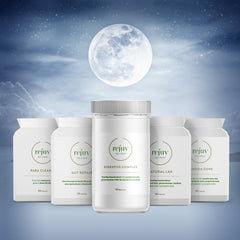Have you heard of The Blue Zones? Dan Buettner wrote the best-selling book “The Blue Zones,” after he travelled to five areas worldwide as part of a large demographic project to study people who have lived past their 100th birthday.
On August 30, Netflix is launching a documentary based on his research called Live to 100: Secrets of the Blue Zones.
Earlier this year, I spoke at The World Biohacking Conference in Dubai, and the blue zones were a hot topic as they offer wonderful insights into longevity and how to live a long, full life.
The latest figures reveal that the average life expectancy in the USA is 78.8 years and 80.7 in most other Western countries. Unfortunately, even though most of our population lives longer, there is a rise in drug overdoses, alcohol abuse, death by suicide and disease.
Buettner set out to find key populations in the world with the highest number of centenarians (people who live over 100), deemed “The Blue Zones,” and then take lessons learned from these populations to help boost longevity worldwide.
Researchers observed that people living in The Blue Zones share several common behavioural and lifestyle characteristics despite being from different areas of the world and of different races, nationalities and religions.
According to The Ikaria Study “some lifestyle characteristics, like family coherence, avoidance of smoking, plant-based diet, moderate and daily physical activity, social engagement, where people of all ages are socially active and integrated into the community, are common in all people enrolled in the surveys.”
The 5 Centenarian Blue Zones

So, where are The Blue Zones? The five blue zones where researchers discovered a higher than usual number of people live much longer than average are:
- Sardinia, Italy
- Ikaria, Greece
- Okinawa, Japan
- Nicoya, Costa Rica
- Loma Linda, California (an area with a large proportion of the religious group called the Seventh-day Adventists)
Buettner cautions that if you live the average U.S. lifestyle, with a diet high in processed foods and little time for exercise or relaxing, you might never reach your maximum life span and could shorten your life by as much as a decade.
This quest for longevity, health and wellbeing led me to develop the 7 Pillars of Wellness framework. After treating clients for more than 25 years, I noticed seven main areas that must be balanced to improve our quality of life.
These seven pillars align with the lifestyles in the blue zones. By addressing each pillar to achieve balance, we are more likely to live a long and healthy life.
Statistics reveal a significantly lower risk of heart attacks, strokes, cancer and dementia in older people living in The Blue Zones compared to the average person in a Western country.
“The world’s longevity all-stars not only live longer, they also tend to live better. They have strong connections with their family and friends. They’re active. They wake up in the morning knowing that they have a purpose, and the world, in turn, reacts to them in a way that propels them along. An overwhelming majority of them still enjoy life.” - Dan Buettner
The Lifestyle Secrets of The Blue Zones People
Centenarians in The Blue Zones live a longer, healthier, more enjoyable life. But this does not come from a single practice alone, such as a good diet or even good genes, but from a combination of habits.
I’ve chosen to focus on seven of these that align with the Seven Pillars of Wellness.
1. Eat More Whole Foods & Less Processed Packaged Foods
Centenarians aren’t usually vegans or vegetarians, but they eat a high ratio of plant-based foods they either grow or buy locally.
Foods that are especially prominent in the diets of the blue zones include:- Vegetables - 4-6 serves per day with a high intake of green veg
- Fruits (1-2 per day)
- Herbs
- Nuts and seeds
- Beans and legumes
- Quality fats like olive oil, olives and avocado
- High-quality dairy products, like grass-fed goat milk, homemade cheeses and organic farm eggs
- Fermented products like yogurt, kefir, tempeh, miso, kimchi and sauerkraut
- Whole grains such as spelt, rice or locally grown (organic) corn (NON-GMO)
- More fish (twice a week) and less meat (twice a month) on average
- Avoiding processed foods such as sugar, fast foods, margarine and hydrogenated oils
- Avoiding foods that come in plastic and artificial packaging
- Low consumption of alcohol
If you find consuming this much fresh fruit and vegetables hard, fast track with our Rejuv Super Greens Powder or Max Vits Capsules.
2. Balance Your Appetite
Interestingly, the centenarians in The Blue Zones never went on diets, and none of them were ever obese. They choose healthy eating as a way of life to nourish themselves.
“The amount and type of food we eat is usually less a function of feeling full and more a matter of what’s around us. We overeat because of circumstances — friends, family, packages, plates, names, numbers, labels, lights, colours, smells, distractions, cupboards, and containers.” Dan Buettner
Eating more whole foods also significantly affects your blood sugar levels as they are naturally low to moderate GI. Whole foods are also more likely to make you feel full.
Eating less sugar and packaged foods with no artificial sweeteners, chemicals, and preservatives also has a powerful effect on your brain, meaning you are less likely to develop eating disorders and overeat. If you struggle in this area and need help reset your appetite and metabolism, you can use our Metabolic Reset Pack.
3. Maintain a Healthy BMI
Most centenarians never had the chance to develop the habit of overeating, and in Okinawa, Japan, they carefully practice the traditional cultural rule of “Hara hachi bu,” which teaches people to eat until they are only 80% full.
In Okinawa, nicknamed “the land of the immortals,” people eat three to four times the amount of vegetables the average Western person eats, and centenarians stay lean throughout their lives with an average body mass index of 18 to 22.
If you have trouble achieving a healthy BMI, consider doing a Gut Cleanse, especially with two supermoons this month. Learn more about why this is a perfect time to reset your digestive system in last week's Supermoon blog post.
4. Improve The Quality Of Your Sleep
Getting a good night’s sleep not only supports longevity but it will also help reduce your stress and tendency to comfort eat.
A lack of sleep can take years off your life, and we know that sleep helps control the hormones that play a big part in appetite and fat storage.
Communities in The Blue Zones get a full, restful eight hours of sleep or more each night, which helps them control stress and cravings.
If you find it hard to get to bed early due to work and family constraints, use your blue blocker glasses to help your body wind down and enter deep restorative sleep. If you find it hard to get deep, restorative sleep, try our bedtime blend capsules.
5. Move Daily & Make It Fun
Centenarians in The Blue Zones lead active lives, yet they rarely go to the gym and don’t see exercise as a chore. Moving their bodies is just a part of their day and way of life as they walk to most places.
They also tend to do more chores by hand with fewer machines and play sports and games with friends. Many also have physical jobs, like farming, instead of sitting behind a desk all day.
The research also found that most like to spend time in the garden and use this time as a form of grounding and to connect more with nature and de-stress. Elle Macpherson also taught me to enjoy movement more by making it fun to get out into nature, transforming how I exercise most days.
6. Reduce Stress & Toxic Load
Staying mindful in today, not stressing about yesterday or tomorrow, forgiving yourself and others, being grateful and staying in flow with nature are vital habits in the blue zones.
Some may call it the simple life, but it does enrich our existence.
Reducing exposure to harsh chemicals and pesticides in our food, hygiene and household products is also essential so your body isn’t bombarded with toxins.
Longevity, after all, is about giving your body what it needs to heal itself daily. For many of us living in the Western world, toxins and heavy metals are already overflowing; instead of allowing it, turn over a new leaf and decide to get your stress in order!
Try our Stress Pack or empty your toxic load with our Detox Pack so you can then choose to maintain these results with The Blue Zone lifestyle habits and practices.
7. Spend More Time With Family & In Nature
Family and family time are everything to the people living in The Blue Zones. Chronic stress can have serious health risks. People in The Blue Zones claim that their routine relieves stress, strengthens their families and social networks, and provides consistent exercise. They make it easy as the family participates in outdoor games, walks and other activities.
Old-age homes don’t exist in the world’s blue zones because people are expected to care for the elderly, especially older family members. Older generations play a pivotal role in The Blue Zones and remain a vital, active part of the family well into their 90s.
Are You Living In The Blue Zone
Living a longer, healthier, more enjoyable life doesn’t come from a single practice alone, such as a good diet or even good genes, but from a combination of habits. These findings fit hand-in-glove with the Rejuv 7 Pillars of Wellness.
How does your lifestyle compare to those living in the blue zones? What can you learn from their routines, diets, viewpoints on exercise, community and beliefs?
Take our FREE Wellness Quiz to determine the top 3 areas to focus on to live with a mind-body balance that improves longevity and prevents disease.









